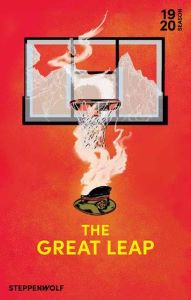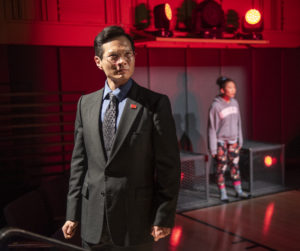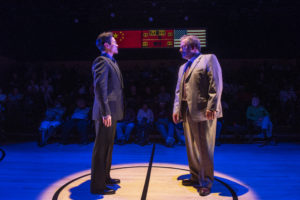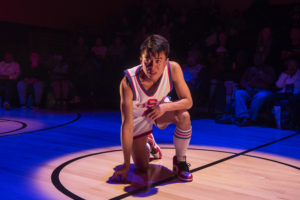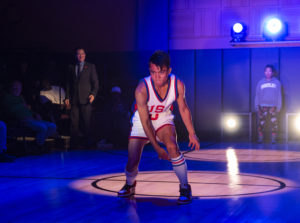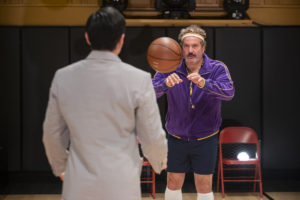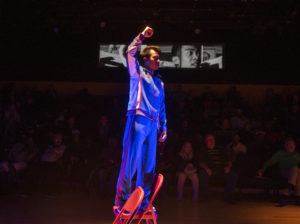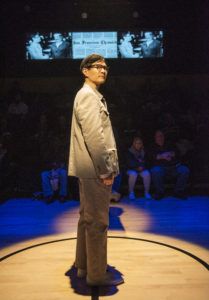HOOP DREAMS IN THE CELESTIAL KINGDOM
No question, Lauren Yee is a wonderful new voice in theater. With Cambodian Rock Band she made crucial connections between iconic survivors and unspeakable genocide. Victory Gardens Theater’s 2018 local premiere was a powerful work of witness and redemption.
Just as remarkable in its fusion of sport and history, people and politics, is Steppenwolf Theatre’s Chicago premiere of The Great Leap. Its clever title is both an allusion to basketball and to Chairman Mao’s communal land reform, “The Great Leap Forward.” This semi-autobiographical play fires on all cylinders and succeeds on many levels.
In two hours and with only four characters, Jesca Prudencio’s game-like staging plays out on Justin Humphres’ scale-model basketball gym in the Upstairs Theatre. Here, in 1989, American coach Saul (Keith Kupferer) holds court, so to speak. He encounters cocky Manford Lum (Glenn Obrera), a hot-shot dribbler and point guard for a local Chinatown team in San Francisco.
Enthusiasm on steroids, this local phenom inserts himself into Saul’s college team as they’re about to head to Beijing for four days to play in a much-anticipated “friendship” tournament. Manford, a brash 17-year-old Chinese-American free spirit, is eager to exhibit his sidewalk passion for free throws (he wins a bet with Saul by shooting 99 in a row) and to check out his heritage in the old country.
But neither American is aware of the agitation that culminates in Beijing with the Tieneman Square massacre of June 4th — exactly when the basketball contest between Beijing University and the University of San Francisco takes place.
Crucially, Connie (Deanna Myers), Manford’s “cousin” and protector from Oakland, arrives to make yet another vital connection. The author’s surrogate, she’s a transfer student ruefully familiar with China’s penchant for conformity and worse. Mother-hen Connie is skeptical that good-will games can make a difference and worries that her young charge could get caught in Cold War crossfire.
Putting much in perspective, flashbacks transport us back to Saul’s visit to Beijing in 1971 for an earlier “friendship” game inspired by the “ping-pong diplomacy” that would encourage Nixon to visit China. There the gung-ho athletic director influences Wen Chang (James Seal), a Party translator and cowed victim of the recent Cultural Revolution, to become a basketball coach in his own right.
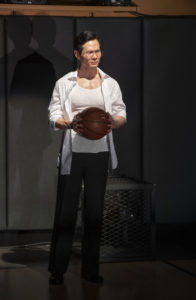 Eighteen years later, Wen Chang’s fateful family reunion with Manford, now uncomfortably involved with the freedom protesters, will expose seminal ties (coincidence verging on contrivance) between the characters.
Eighteen years later, Wen Chang’s fateful family reunion with Manford, now uncomfortably involved with the freedom protesters, will expose seminal ties (coincidence verging on contrivance) between the characters.
Much more than a metaphorical culture clash, the final basketball rematch is a thrillfest, bringing to a boil a family’s strained relations over eighteen years and fusing betrayal and reconciliation. In the final scene Wen Chang even becomes the most remembered figure of the 1989 revolt.
Along the way Yee delivers delicious details, like the cautions that the American team gets from the State Department and Chinese watchers, and the intricate intersection of hoop dreams and national identity. We discover the superpowers’ divergent playing styles, contrasting capitalist reliance on ruthless individuality and independence, aggression and distraction (where “it’s always your turn”) with the “group-play” of the awesome Communist players (“tall trees” rumored to be 7 feet or more).
In the end the game’s outcome matters less than the psychological distance that four folks travel to rise above their countries.
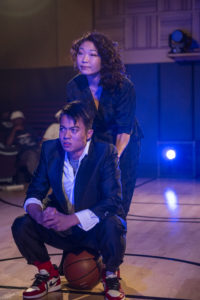 If basketball is a confluence of speed, accuracy and height, so is Steppenwolf’s kinetic production. This warm and witty affair is sparked by stellar performances from a million-dollar quartet. Kupferer cogently suggests Saul’s tough-minded, no-nonsense training, a gruff contrast to Obrera’s rebel-punk provocation; his inexhaustible portrayal is the best proof of youth and an incredibly athletic portrayal (even if the hoops are unseen).
If basketball is a confluence of speed, accuracy and height, so is Steppenwolf’s kinetic production. This warm and witty affair is sparked by stellar performances from a million-dollar quartet. Kupferer cogently suggests Saul’s tough-minded, no-nonsense training, a gruff contrast to Obrera’s rebel-punk provocation; his inexhaustible portrayal is the best proof of youth and an incredibly athletic portrayal (even if the hoops are unseen).
Myers mirrors all of Connie’s concerns. Seal’s stiffly repressed Wen Chang is a marvel as he mellows. We see and feel Yee’s richly developed characters from every side, as well as inside out. Perfectly reflecting every permutation of the action on each side of the “stadium,” Rasean Davonte Johnson’s seamless projections and dazzling videos are characters in themselves.
As with Cambodian Rock Band, Lauren Yee, a genius playwright with a perfect touch, finds the truths in tiny stuff and big reveals. The Big Leap is just that. It lands hard and true.
The Great Leap
Steppenwolf Theatre Company
Steppenwolf’s Upstairs Theatre
1650 N Halsted Street
ends on October 20, 2019
for tickets, call 312.335.1650 or visit Steppenwolf
for more shows, visit Theatre in Chicago
